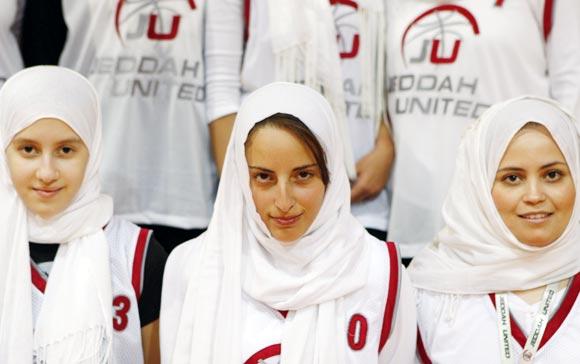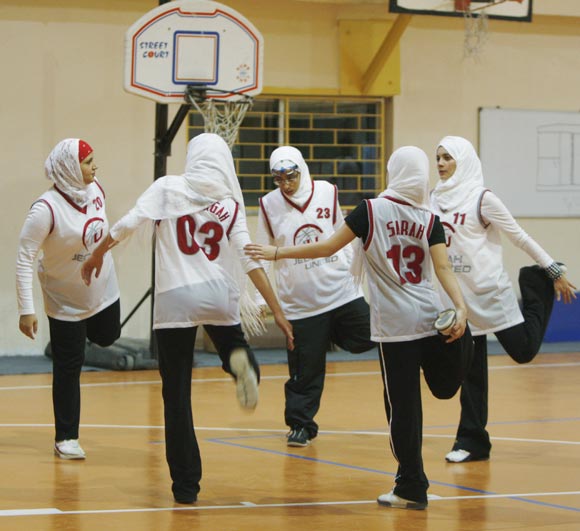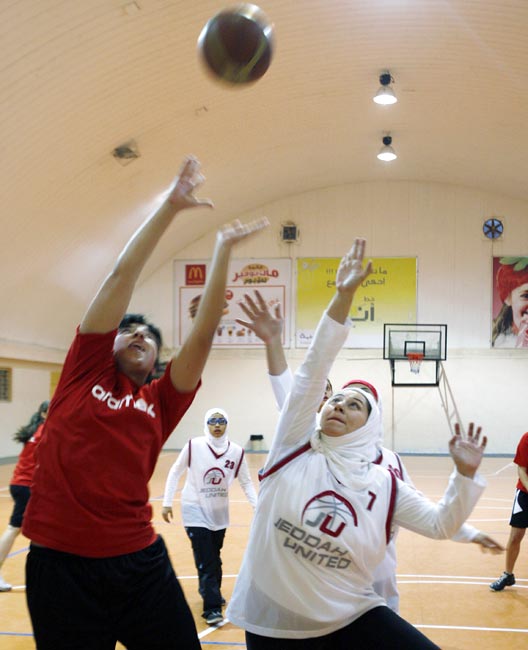Photographs: Reuters
The image of 24-year-old Nour Fitiany resting courtside as the pounding of basketballs and thumping of feet reverberated around her wouldn't merit a second glance in most countries.
But in Saudi Arabia, where girls are banned from sports in state schools, powerful clerics castigate women for exercising and female gyms must adhere to strict regulations, Fitiany's ambition to play basketball - let alone represent her country in international tournaments - is a bold political statement.
- Hijab ban driving women away from soccer
"I hope that when they see that there are girls who really want to play, and who do play regardless of the obstacles that lie in their path, they realise that they have to do something," she said, dressed in a baby blue t-shirt and grey jogging pants, spinning a basketball on her index finger.
Female participation in sports has long been a controversial issue in the conservative Islamic kingdom, which on February 15 was lambasted by Human Rights Watch for never having sent a woman athlete to the Olympics.
The stance of the official Supreme Council of Religious Scholars is represented by Sheikh Abdullah al-Maneea, who said in 2009 that the excessive "movement and jumping" needed in football and basketball might cause girls to tear their hymens and lose their virginity.
After King Abdullah moved last year to bring women into the country's political process, however, there have been some signs authorities may allow sportswomen to compete internationally and make it easier for girls to exercise.
The HRW report said the National Olympic committee had "indicated" it would not stop women athletes taking part in the Games if they were invited, and speculation has been rife that the government will send equestrian Dalma Malhas to compete in this years Olympics in London.
'Some people are extremist or extra conservative'
Photographs: Reuters
The Saudi Arabian General Investment Authority said earlier this year there are plans to introduce after-hours physical education classes for both girls and boys.
The kingdom's official sporting body, the Saudi General Presidency of Youth Welfare, did not respond to the questions on the issue.
Sports in the patriarchal society of Saudi Arabia has long been reserved as an activity for men. Even stadiums for watching sports prohibit females to be present.
Women are able to play in the privacy of their homes or in private schools but as soon as they step beyond that to play professionally or in organized teams in public competitions they are publicly slammed for going against their natural role.
Newspaper articles that refer to such women as "shameless" when they play sports are a cause of great embarrassment for the women and their families. Some have even received text messages advising them to stay at home and tend to their household duties as mothers and wives.
"If there is no support from the family we can not get into these types of activities ... some people are extremist or extra conservative," said Hadeer Sadagah, 17, who plays with Fitiany on their basketball team, Jeddah United.
Jeddah United was set up in 2003 to promote women's fitness; Malhas, who specialises in show jumping, trained privately and has competed in international tournaments since she was young.
A group of Saudi women is also planning a hiking expedition to Everest base camp this summer as part of a charity fundraising exercise to promote a healthy lifestyle for breast cancer patients.
'People who are against women's sports are actually against women'
Photographs: Reuters
Billionaire Prince Alwaleed bin Talal, a nephew of the king who is known to be a supporter of women's rights, has included women in his Kingdom Equestrian Team, part of his company Kingdom Holding, which has allowed Saudi women to compete in international competitions since 2007.
Liberal Saudis consider women who participate in sports to be pioneers and encourage the women to play regardless of the obstacles.
"We have a very famous Arabic saying that goes, 'a healthy brain needs a healthy body' so from that I believe that people who are against women's sports are actually against women," Jeddah resident Hashim Larry, 27, said.
"They come from the same group of 'don't allow women to work and drive'."
The pressure against women in sports is intense and comes from senior figures in a clerical establishment that is closely allied to the ruling al-Saud family.
In 2010 Sheikh Abdulkareem al-Khudair, who also sits on the Supreme Council for Religious Scholars, renewed a religious edict banning sports for women, which he said "will lead to following in the footsteps of the devil".
He said it is not permitted to request that the government introduce sports in schools for girls because such activity is forbidden in Islam. Such comments from a high ranking cleric have immense influence in the monarchy, which rules in alliance with the conservative clerics.
Even female gyms have to wear a non-sporting fig leaf
Photographs: Reuters
When Jeddah United returned from a tournament in which they played the Jordanian national team, in 2009, a local newspaper published their photograph under the headline: "Shameless girls".
The religious pressure is so great that even female gyms have to wear a non-sporting fig leaf, masquerading as "health centres" that are regulated not by a national sports body but by the Health Ministry.
Fees are so high, at a minimum of 1,000 riyals a month, that only the affluent can afford membership.
In 2009 a clampdown on unlicensed female gyms gave rise to a women's rights campaign in newspapers and blogs, with the sarcastic slogan "Let her get fat!"
"As a nation we need to focus on preventative measures that include healthy lifestyle, specifically nutrition and fitness and early detection (of women's illnesses)," said Princess Reema al-Saud, who is leading the climb to Everest base camp.
"The inspiration to climb Everest base camp came from the basic idea that a healthy lifestyle and healthy body can fight illness better," she added.
'We play a role of sport diplomacy by building bridges'
Photographs: Reuters
The lack of facilities for women is a significant barrier in a country where gender segregation is strictly enforced.
While girls' state schools are barred from teaching physical education and consequently have no sports facilities, some private schools and private universities are very well equipped.
Jeddah United practices in one of the few courts available for women, surrounded by 5-meter (16-foot) concrete walls, which it rents for 7,000 to 10,000 riyals a month. Members get training and the opportunity to play three times a week for a monthly fee of 600 riyals.
"We believe that (Jeddah United) is a pressure group to promote a healthy lifestyle on a local level and on an international level," said the team's founder, Lina al-Maeena.
"We play a role of sport diplomacy by building bridges and breaking stereotypes of Saudi women -- I hope that we are paving the way."
'Women playing sports should ignore the criticisms'
Photographs: Reuters
Malhas, the equestrian who might yet be selected to represent the kingdom in London, trained in exclusively private facilities in Saudi Arabia.
She has already competed in international tournaments, which she travelled to by herself, financed not by the state but by her own family.
In the Singapore Youth Olympics in 2010 she stood on the podium to receive a bronze medal, although she was not officially delegated to represent the kingdom.
"I think women playing sports should ignore the criticisms they get from society," Fitiany said.
"That is a kind of struggle, standing strong and not caring what people say."







Comment
article